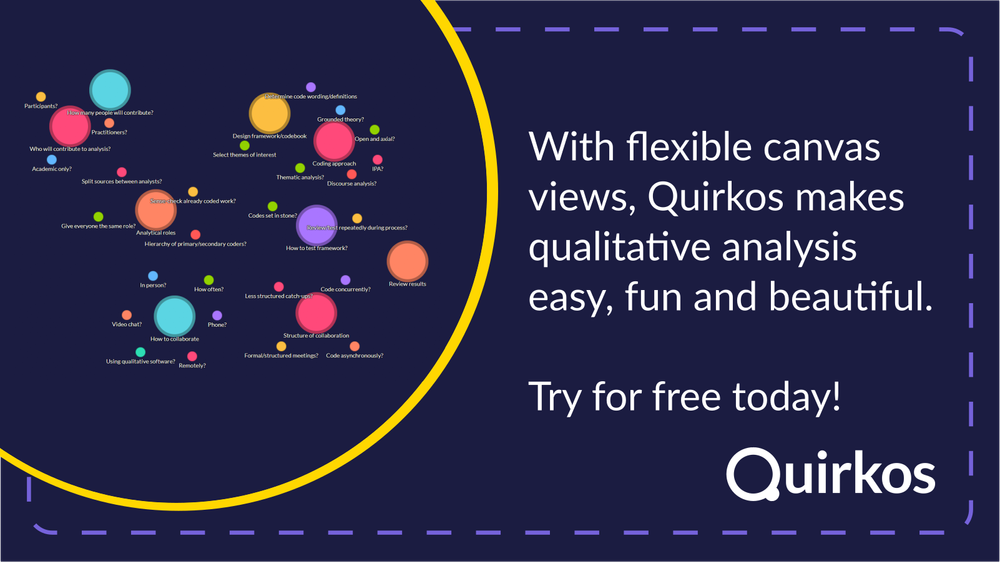Free qualitative data analysis software
We have listed the best current options for free and open source qualitative data analysis software (CAQDAS), to analyse your data on no budget.

Options for free and open-source qualitative software
There are large number of options for free and open-source software tools for qualitative data analysis. They can help you explore, analyse and manage qualitative data, but each have their own strengths and weaknesses.
But first, let’s be honest. When you ask for Free, do you mean Free as in Freedom, or Free as in beer? Open-source software means that the programming and software that makes the software work are available for anyone to look at, change and improve on. You can see and trust how the programme works, and if you have the technical know-how, adjust it to do exactly what you need it to. That’s the free as in freedom.
But that doesn’t mean that they are all free as in beer. Some open-source software packages charge a fee to download, and this helps pay for their development and support, just like commercial software. This article will cover both types of open-source software, but also discuss the benefits of some of the commercial options. It may seem a bit strange that I want to write about open-source alternatives to Quirkos, but I genuinely believe in open-source, and also that qualitative researchers have such diverse needs from their software that there is no one-size-fits-all solution. I also see people asking all the time 'Why isn't there a free alternative to Nvivo?' but there are many!
The best free and open-source qualitative software in 2025: pros and cons of all options
There have been a lot of open-source qualitative software options in the past, but many of them have not been updated in a while or can be difficult to get going, so I am going to cover four that are still current (as of 2025). I’ve used most of them, and will give my opinion of their pros and cons below:
Aquad
Aquad is probably the most conventional option in terms of interface and operation, even if it looks a little dated. It covers the basic code and retrieve functions for text, but also includes multimedia support. Aquad focuses on a few niche approaches such as their implementation of sequential analysis, implicant analysis and what they call ‘paraphrases’. Getting into these mindsets might take some researchers some time. Originally developed in German, there is also an English translation, although there is less documentation in English. It’s one of the few that is still fairly current, but will install on Windows without having to install a lot of other software to support it. There is no current Mac or Linux version.
Pros of Aquad:
- Multimedia support
- Helpful for more niche analysis methods, to get a new perspective on your data
Cons of Aquad:
- No versions for Mac and Linux
- Less intuitive if you just want to apply a standard method
- Less documentation in English
RQDA
This is a plugin for the R open-source statistical software package and programming language, a very powerful alternative to SPSS. RQDA adds a basic interface that lets you bring in text sources and perform basic coding operations to mark up the text. It’s a very powerful tool if you want to do statistical analysis of your coded data, since it allows you to use any part of the R programming language to do text analysis and quantitative tests. However, the purer qualitative elements are a little lacking, and it has a lot of requirements to install. You will need to have R installed on your computer, as well as GTK+ and some of these packages can be very tricky to get working on Windows at the moment. It’s a little easier for Mac and Linux, but a lot of the documentation is out of date.
Pros of RQDA:
- Great for statistical analysis
- Great if you know R
- Powerful if you know exactly what you are looking for
Cons of RQDA:
- Lots of prerequisites for installation (R, GTK+)
- While technically works on all operating systems, the experience is worse on Windows
- Arguably stronger at quantitative analysis vs. qualitative analysis
Taguette
This is the newest option, and while essentially another server based software package, since it works in the browser, it’s easy to work with and also has a free hosted version on their website. At the moment it only provides very basic functionality, with very little in the way of outputs or visualisation. However, it is in active development and has great potential with a lovely clear interface. The team are very engaged on Twitter taking suggestions, so it’s definitely one to watch.
Pros of Taguette:
- Easy interface
- Works in the browser
- Active development team
Cons of Taguette:
- Very basic functionality
- Not very much in the way of visualisation or outputs
QualCoder
QualCoder is an open-source qualitative coding platform that runs on Windows, Mac and Linux. It releases regular updates and has multi-media capabilities, so it can handle video and audio as well as documents and text. It offers an AI chatbot module, novel for the fact it's fully optional and disabled by default. However, as a whole we caution against the usage of AI chatbots in qualitative data analysis. It also has no live coding or live collaboration. While many options are hidden behind menus, it may provide a smoother transition for those who are already used to NVivo or MAXQDA.
Pros of QualCoder:
- Feature-filled, including multimedia coding
- Cross-platform: works on Windows, Mac and Linux
Cons of QualCoder:
- No live coding or collaboration
- Complicated interface
- Not many hands-on resources/tutorials - mostly text-based, or video tutorials created by users
Other options
The Wikipedia page for qualitative analysis software (CAQDAS) lists another couple of options, but quite a few of these are either quantitative text analytic tools, or haven’t been updated in some time. This means that they frequently won’t install properly on modern operating systems. All these free tools also don’t offer support, so if you get stuck or run into a bug, you can get very stuck.
Is it worth paying for qualitative analysis software?
However, it’s also worth considering the standard commercial options like Quirkos, NVivo and Atlas.ti. Although they may require an up front fee, they also offer support and much simpler installation and operation than many of these options. I love open-source software, and use it everyday. However, I feel that at the moment most of the open-source qualitative analysis software options are lacking in some important way.
Realistically, open-source software works best when the people using it are able to contribute and add to the development of the code. However, for qualitative analysis (not quantitative text analytics), there are few social scientists or those in the humanities using qualitative methods who also are able to develop software code. This means that almost all these software packages have only ever been developed by one person – the original founder. They haven’t managed to grow a community around them, and that leaves them abandoned when the original founder moves on. This happened to the excellent WeftQDA.
That was the reason that I made the decision not to make Quirkos free and open-source. Charging a fee for the software (even the lowest one of any paid software package) allows us to hire a full time software developer, who keeps Quirkos working when operating systems are updated, fix bugs and adds new features that our users request. It also allows us to offer 7-day-a-week support, so that when people get stuck, or have questions about how to use Quirkos, we can help them. That means that researchers can trust that their work won’t get lost and they will have support to finish their analysis.

- Since Quirkos is also easier to learn than many of these options, it can save valuable time using the software, letting you spend more time on your data. Our aim was always to make the most accessible qualitative data analysis software, and for me that meant having a professional service with a low cost to entry that is reliable and dependable. You can download Quirkos for free, try it for 14 days and see how Quirkos and Quirkos Cloud lets you easily work with your qualitative data.
